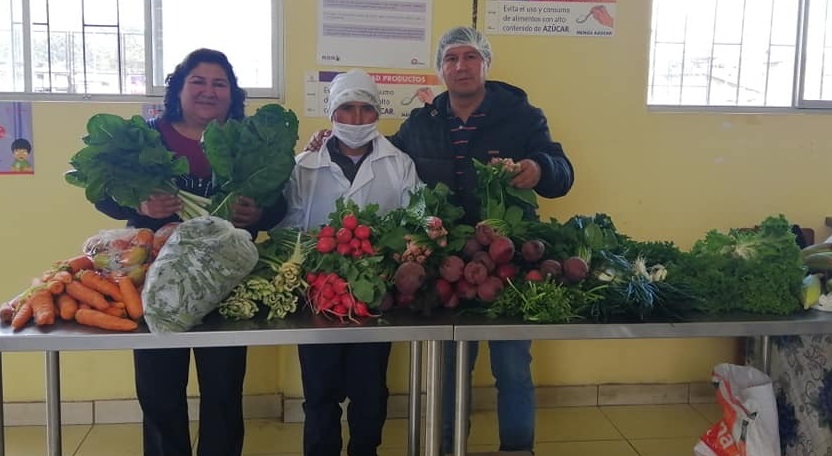Director Nila Gonzáles, from Huancayo, Peru, highlights the benefits of Sustainable Schools for students and the community
A few years ago, the students of the school 30.012, in Huancayo, Peru, did not pay much attention to their school garden. They did not have a clear awareness of the relationship between food and health and did not realize the importance of caring for the environment. But all this changed, as the director Nila Gonzáles says. She is in charge of the school located in the district of Chilca, and explains that the improvements occurred with the implementation of the Sustainable Schools methodology, developed by the Brazil-FAO Cooperation. The metholodogy is implemented in this school since 2016.
Today the school garden is considered “natural garden” loved by the students. “Seeing plants grow and understanding that their are living beings is very healthy. We also make researches in other areas of knowledge and this is a very powerful change. Previously, you had to imagine the growth of a plant and its parts, and now the students have the possibility to look, touch and even consume the food planted by our hands”, says teacher Nila Gonzáles.

For Gonzáles, the garden is an important place to work on different topics such as science, technology, communication and mathematics. “It is very rich to take advantage of all these possibilities for an education towards sustainability,” she says, reinforcing the commitment of teachers and families. In ddition, children take this knowledge about healthy eating to the communities where they live.
“All this results in a new way of life that one adopts to consume healthyly. We all learn, the managers, the community, the families. If we eat healthy food, we will have healthy children in a more sustainable future”, evaluates.
The process
It was necessary to convert the educational institution into a sustainable school by organizing a commission for the purchase of healthy food from family farming, such as local fruits and vegetables, and the implementation of a budget for that. In the beginning, the school bought a lot from the markets. With the purchase and delivery of food from local products, the quality of the menus offered to the 1,200 students improved.
Purchases from family farming and healthy menus are two of the pillars of the Sustainable Schools methodology. The others are school gardens, which teacher Nila considers a powerful pedagogical tool to raise awareness and promote healthy habits. Social and community participation is another point of Sustainable Schools. The involvement of local communities and actors is fundamental, since this participation constitutes a solid basis for the sustainability of the actions carried out in schools and is a transversal axis in a sustainable school feeding program. “It is a work of many hands, there are many people involved… Fathers, mothers, directors, teachers and producers”.
Nila points out the importance of involving local authorities, such as mayors, who provide support and resources to the actions. An example of the involvement of society occurred during the pandemic, when the local government supplemented the Qali Warma (the school feeding program ffrom Peru) with packages of products such as vegetables and native potatoes that were distributed to the families of the students and strengthened food security during the period.
Training
Nila emphasizes that trainings, especially those developed and supported by the Brazil-FAO Cooperation, were essential for carrying out this task. “The trainings we have received, the information, the contribution, all of that was essential. We are very grateful to the Brazil-FAO Cooperation, which has visited us, has strengthened us, has motivated us.” Finally, she calls on the authorities so that everyone contributes to this purchasing model of family producers.
“It is a very nice experience to be part of this huge network of Sustainable Schools in the Junín region. So that more boys and girls can have the opportunity to eat healthy, fresh and adequate food. We want to continue working more with our fathers and mothers of family, our teachers, our directors, our government authorities who are concerned with this issue… It is a very strong effort from all of us that is very worthwhile”.






